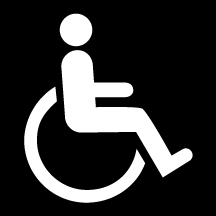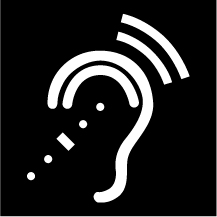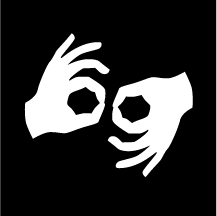ADA PolicyPalm Springs Art Museum (the “Museum”) is committed to ensuring that its programs and services are accessible to the broadest range of people with disabilities. Following the guidelines of the American Disabilities Act (ADA), which guarantees equal and full access to employment and public services for people with disabilities, the Museum does not discriminate on the basis of disability in admission or access to, or employment in its services, programs, or activities. The Museum will provide reasonable accommodations to allow individuals with disabilities to participate in all Museum services, programs, and activities.
Guests with limited mobility who are arriving by vehicle can gain access to a passenger unload and load zone via the north parking lot, in front of the Box Office. A passenger unload and load zone is located approximately 15 feet from an elevator that will take you to the lower level. Accessible parking is available directly across from the Box Office. The south parking lot also has accessible parking with ramp access to the lower level. A valid accessibility parking permit is required. Accessible parking is located adjacent to the building with an accessible ramp on the right side of the main entrance. If visiting the Palm Springs Art Museum, accessible restrooms are located on the lower level and the 3rd floor. If visiting the Architecture and Design Center, the restrooms on the lower level are accessible. The Museum will make all reasonable modifications to policies and procedures to ensure that people with disabilities have an equal opportunity to enjoy all of its programs, services, and activities. Anyone who requires an auxiliary aid or service for effective communication or a modification of policies or procedures to participate in a program, service, or activity of the Museum should contact the ADA Coordinator at adacoord@psmuseum.org as soon as possible. All other complaints should be in writing and contain information about the alleged discrimination or denial of accommodation such as name, address, phone number of complainant and location, date, and description of the problem. Alternative means of filing complaints, such as personal interviews or a tape recording of the complaint will be made available for persons with disabilities upon request. The complaint should be submitted by the grievant and/or his/her designee as soon as possible but no later than 60 calendar days after the alleged violation to: Palm Springs Art Museum P.O. Box 2310 Palm Springs, CA 92263 If the response by the Palm Springs Art Museum’s ADA Coordinator or his/her designee does not satisfactorily resolve the issue, the complainant and/or his/her designee may appeal the decision within 15 calendar days after receipt of the response to the Museum's Executive Director or his/her designee. Within 15 days after receipt of the appeal, the Museum's Executive Director or his/her designee will meet with the complainant to discuss the complaint and possible resolutions. Within 15 calendar days after the meeting, the Museum's Executive Director or his/her designee will respond in writing, and where appropriate, in a format accessible to the complainant, with a final resolution of the complaint. All written complaints received by the Museum’s ADA Coordinator or his/her designee appeals to the Museum's Executive Director or his/her designee, and responses from these two offices will be retained by the Museum for at least three years. |





